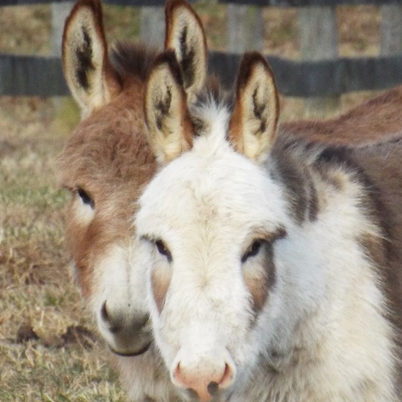Obesity In Donkeys
Obesity in donkeys is a real health problem – sadly, one that many people don’t seem to understand or take very seriously. Most donkeys that are kept as pets are too fat. Donkeys metabolize carbohydrates so efficiently that it’s very easy for them to put on excess weight. Their access to nutrition far exceeds their ability to burn it off. Donkeys tend to store all this excess in the form of fatty deposits, or fat pads, all over their bodies. They can develop very large “cresty” necks, and when the neck gets too fat, it will flop over to one side. The reason it does this is that the nuchal ligament that runs along the top of their neckline gets stretched and can no longer support the weight of the fat neck. This results in the crest falling over to one side. Once it does this, it can never become upright again. It doesn’t seem to cause them any pain, but it is a huge indication that the donkey is or has been too fat.
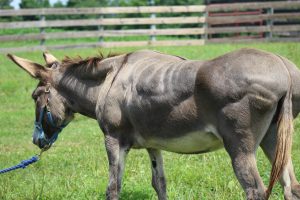
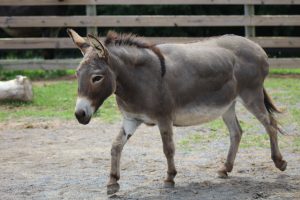
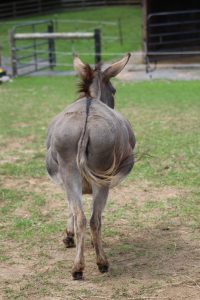
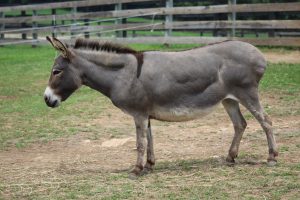
Donkeys also will develop fat pads along their rib cages and their buttocks, including at their tail head. Extreme cases result in a donkey who has difficulty raising its tail high enough to pass manure easily. A donkey with excess fat has difficulty with every part of normal life activities. Their feet and joints hurt, they have difficulty lying down and getting up, and they have trouble rolling, or even relieving an itch somewhere. They can be so fat that their back is either flat or concave. When they roll, they are unable to reach this area, which can begin to get bacterial infections due to water puddling in it. Donkeys with excess fat really have a hard time with everything.
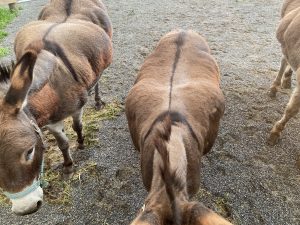
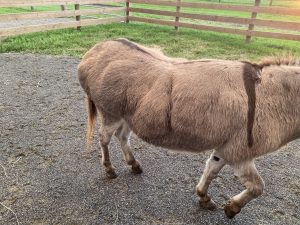
A healthy donkey might look a bit on the thin side if you are comparing their shape to that of a horse. A healthy donkey should have a more angular shape, while a horse will have a more “rounded” shape and have a round, plump-looking hind end. A donkey should have more of an “A-Frame” look to it when you are looking from behind. You should be able to feel but not see their ribs. Their ribs should have a thin layer of fat over them, and there should be a thin layer of fat or muscling over their hip and shoulder areas.
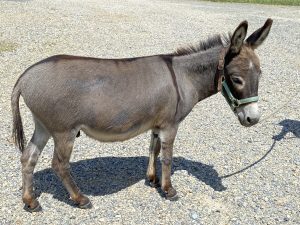
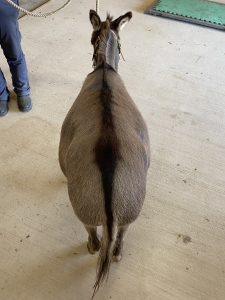
All of this leads back to our discussion about donkey nutrition and their need for a dry paddock, and exercise.
There are a host of other issues that obese donkeys deal with. For more detailed information, please check out the following articles:
Hyperlipidemia also known as Hyperlipaemia
Hyperlipidemia Syndrome in Donkeys
Hyperlipidemia Syndrome in Donkeys is an article written by our Veterinarian which gives you the basics of what causes Hyperlipidemia, but we wanted to share with you firsthand how we treat our donkeys when they even start to shut down and not eat. First and foremost, it doesn’t really matter WHY your donkey might not be eating, it could be a fever, stress, depression, shock, or any number of other reasons. The key is that you MUST make sure that IN ADDITION to treatment for whatever illness they might have, they MUST eat and keep their blood sugar up. It can be easy to miss the fact that your donkey might not be eating well, especially if it lives in a herd, and you don’t bring them in specifically to eat or to spend the night. By the time you might realize that your donkey really is not feeling well, it might not have eaten well for days, and by then, their triglycerides can already be on the rise. It’s critical that if you notice your donkey really not wanting to eat, that you offer anything you can think of that it might like. Diets go out the window in these cases. Try apples, carrots, their favorite treats, green grass, anything to try and get it to eat. In addition, you can give Karo Syrup, it’s the best way to help keep their energy and blood sugar up. You can dose about 30cc in their mouth 2-3 times a day. Just the addition of some Karo Syrup can make the difference and help them bounce back. It can also be the lifesaving difference that keeps them from going downhill even faster than they might have, before you can get them to a vet hospital.
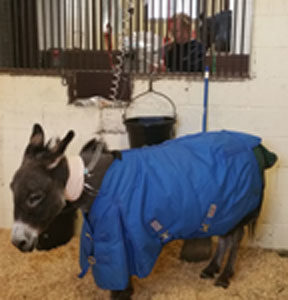 No matter what, DO NOT WAIT! If you know for sure that your donkey is not eating well at all, it will never hurt to give it some Karo Syrup. But, if you notice any more than about a day of not eating, you need to have your vet out right away to pull blood and have them run a lipid panel to make sure that the triglycerides are in a safe area. If they are on the rise (anything over 100 is cause for concern) they need iv fluid therapy. The vet will give them iv dextrose and insulin, as well as fluids to keep them hydrated. The goal is to get the blood sugar balanced, and get the donkey feeling better so that they will start eating on their own again. It can take a few days on fluids to get them on the road to recovery.
No matter what, DO NOT WAIT! If you know for sure that your donkey is not eating well at all, it will never hurt to give it some Karo Syrup. But, if you notice any more than about a day of not eating, you need to have your vet out right away to pull blood and have them run a lipid panel to make sure that the triglycerides are in a safe area. If they are on the rise (anything over 100 is cause for concern) they need iv fluid therapy. The vet will give them iv dextrose and insulin, as well as fluids to keep them hydrated. The goal is to get the blood sugar balanced, and get the donkey feeling better so that they will start eating on their own again. It can take a few days on fluids to get them on the road to recovery.
